Woman Decides To Spend $7000 On Her Cats' Teeth, Husband Says She Should Have Euthanized Them Instead
Whether it's due to trauma, gum disease, or another ailment, many cats may eventually need to have their teeth pulled out. A cat's tooth removal is a permanent and irreversible procedure.
It is a technique that is very effective in alleviating the continuous discomfort and suffering caused by a broken tooth. Dental work on cats is quite complicated and takes a long time.
Since it can take between 40 and 60 minutes to remove a single cat tooth, the cost of tooth extraction for cats, in a sense, reflects the time needed to complete the procedure. Once you take into account the cost of general anesthetic and IV fluids, the expenses may start to increase.
Meet u/[deleted], the OP in today's story, who has three cats she loves dearly. The OP's husband isn’t an animal person but tolerates the cats.
The OP was informed at their annual checkup that the older two cats needed teeth cleanings and some extractions. Lo and behold, it turned out they had broken teeth, exposed nerve endings, periodontal disease, and were likely in significant daily pain.
The teeth need to be pulled, and a lesion biopsied, which costs about $7,000. Of course, her husband wasn't happy about this and believes the OP should have just gotten new cats.
The OP Writes...
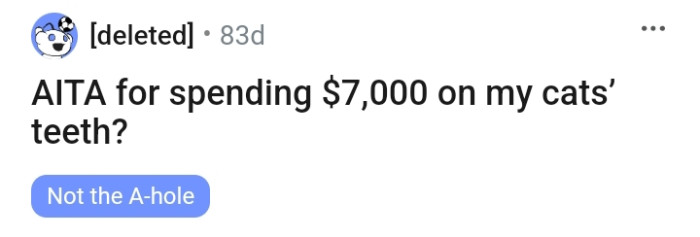
The OP's husband isn’t an animal person but tolerates her cats
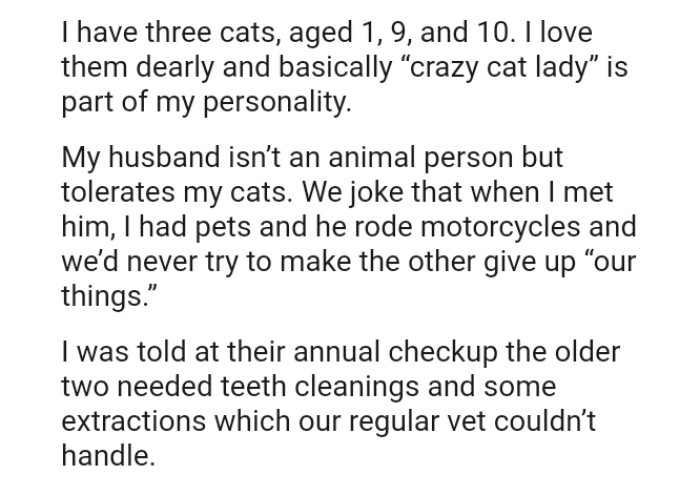
They had broken teeth, exposed nerve endings, periodontal disease, and were likely in significant daily pain
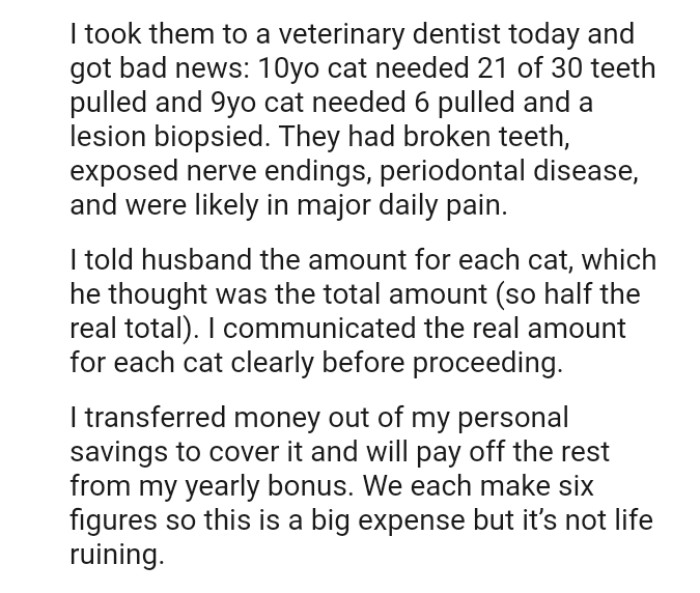
The Emotional Bond Between Pets and Owners
The emotional connection between humans and their pets is a well-documented phenomenon in psychology. According to Dr. John Gray, a relationship author, "The bond we share with our pets can significantly enhance our emotional well-being, providing companionship that alleviates feelings of loneliness." Research indicates that pet ownership can lead to improved mental health, including lower levels of depression and anxiety. As noted on Dr. Gray's website, this bond often leads to strong feelings of responsibility for the pet's well-being, which may explain the woman's decision to invest heavily in her cats' dental care. For many, pets are seen as family members, and the choice to seek medical care reflects deep emotional ties driven by attachment needs.
The OP thinks they are young and have plenty of good life left
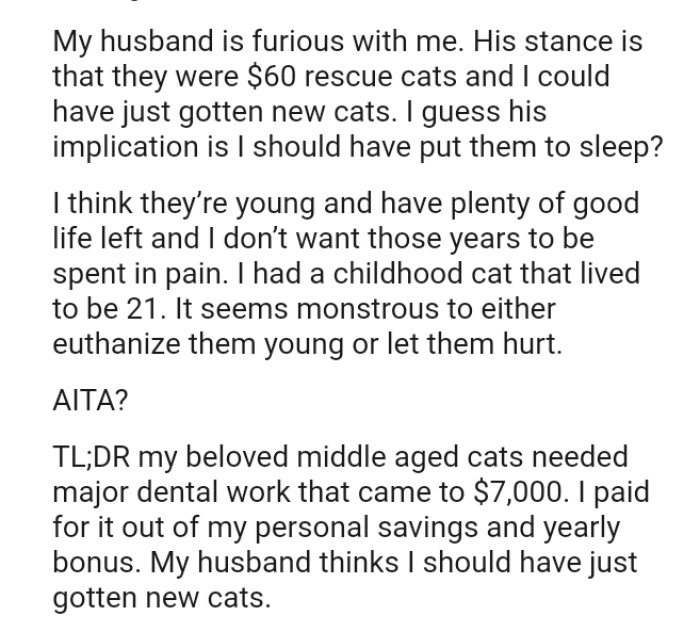
We've gathered comments from Redditors for you to read through below

It's your personal money, and you can spend it how you like

It's important to recognize how financial decisions regarding pets can trigger various emotional responses. A clinical psychologist notes that spending significant amounts of money on a pet's health can create feelings of guilt or inadequacy if one perceives the costs as excessive or unnecessary. This feeling can be exacerbated when faced with a partner's disagreement, as in the case presented in the article.
Conflict can often arise from differing values or beliefs about what constitutes acceptable care for pets, which can be deeply rooted in individual upbringing and personal experiences with animals.
His attitude towards your cat is bad
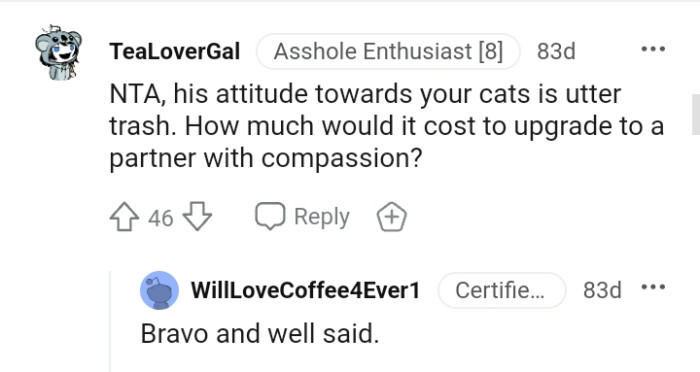
You don't just put your kids down because they're sick
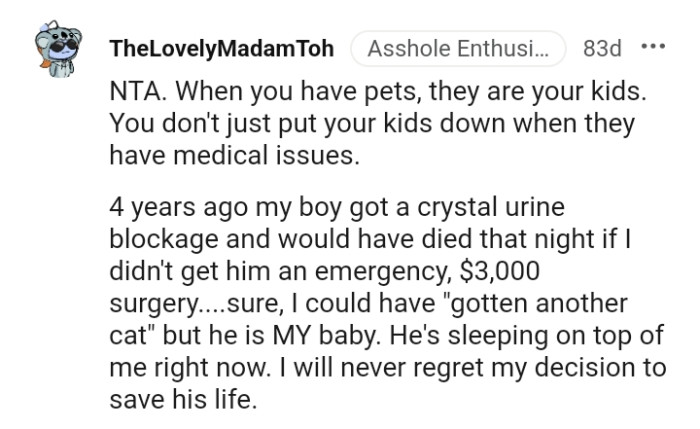
Re-home someone with a mindset like that
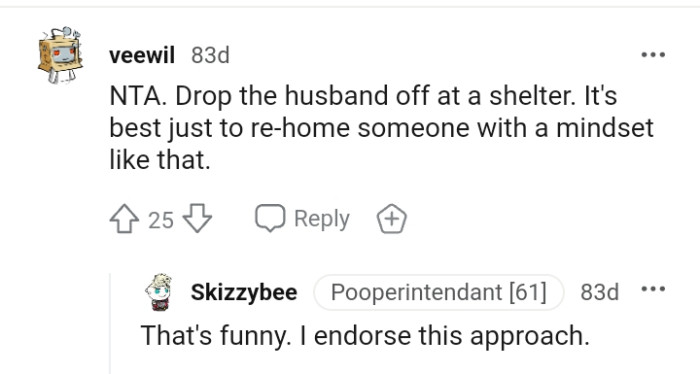
Cognitive Dissonance and Decision-Making
The situation illustrates a classic case of cognitive dissonance, where the woman’s actions (spending $7,000) conflict with her husband’s beliefs (that euthanization would be a better option). Cognitive dissonance theory, developed by Leon Festinger, posits that individuals experience discomfort when holding two conflicting views, leading them to alter one belief or rationalize their actions to alleviate the discomfort.
Research indicates that cognitive dissonance can lead to significant psychological stress, where individuals may justify their decisions to maintain internal consistency. In this case, the woman might rationalize her spending on dental care as a moral and ethical obligation to alleviate her cats' suffering, which could mitigate the emotional distress stemming from her husband's opposing viewpoint.
He is awful for just assuming you'd kill your cats
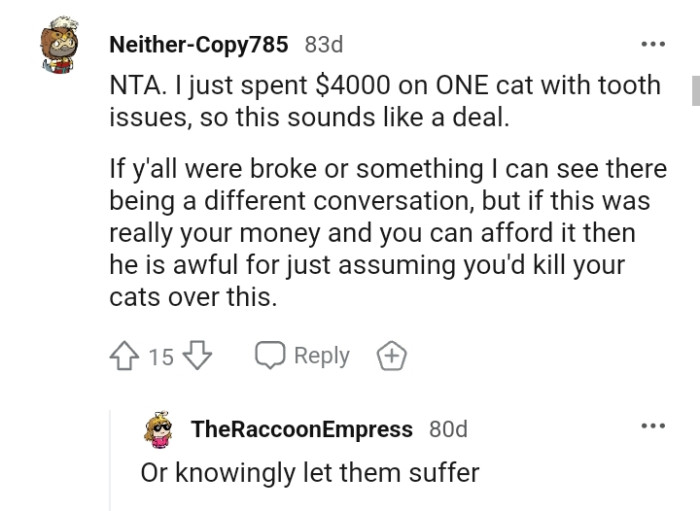
Marrying someone who lacks basic compassion
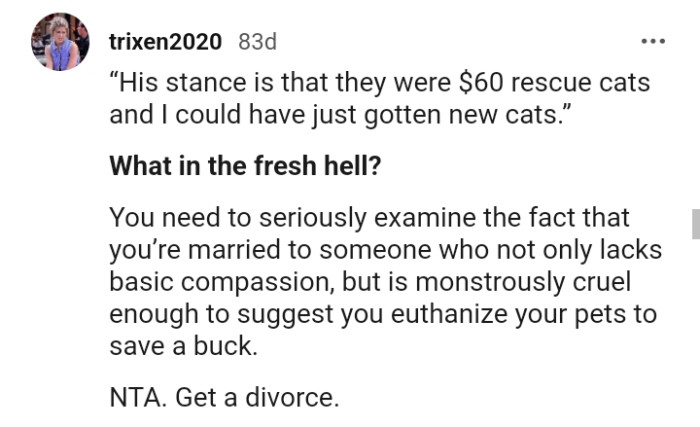
Buying pet insurance for your cats

A behavioral psychologist emphasizes the role of societal norms and values in shaping the perception of pet ownership responsibilities. In contemporary society, there is increasing recognition of pets as family members, which influences how individuals prioritize their care. This shift can lead to heightened expectations regarding the treatment and maintenance of pet health, often overshadowing traditional views that prioritize cost-effectiveness.
Moreover, the emotional distress associated with a pet's suffering may compel pet owners to seek extensive medical interventions, sometimes leading to financial strain. This highlights the need for open communication between partners regarding financial boundaries and shared values about pet care.
This man has displayed a gobsmacking lack of empathy
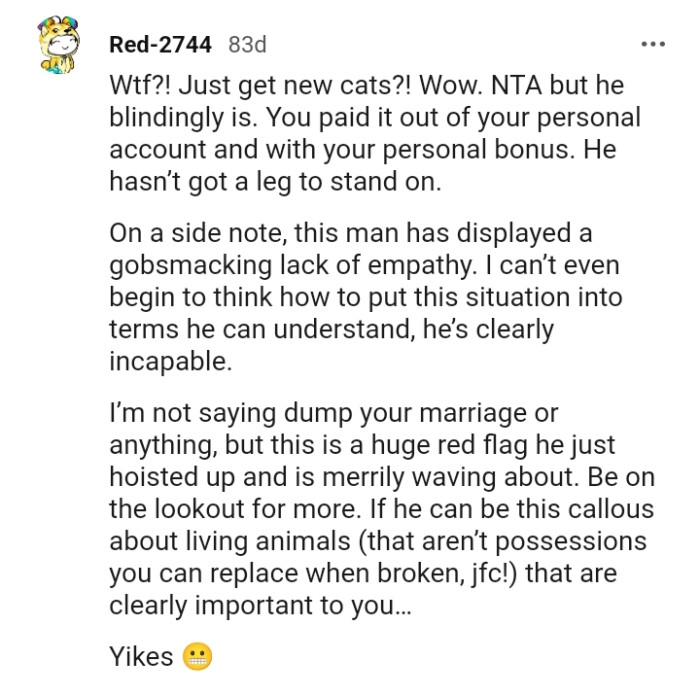
Having pets means taking on new responsibility
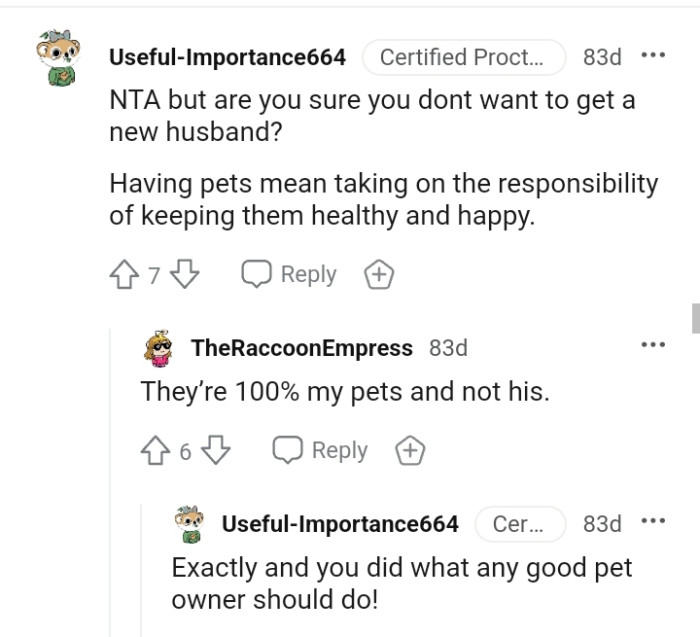
They do not cover pre-existing conditions

Guilt and Responsibility in Caregiving
Guilt plays a significant role in caregiving decisions, especially when it comes to pets. The woman’s choice to invest in her cats' dental health may stem from a deep-seated sense of responsibility, often referred to as 'caregiver guilt.' This phenomenon is characterized by feelings of inadequacy when one perceives they are not doing enough for those they care for.
Research indicates that caregiver guilt can lead to stress and anxiety, and in some cases, even burnout. To counteract these feelings, experts recommend that caregivers engage in self-compassion practices, which can help alleviate the pressure of perceived responsibilities. Understanding that each pet owner has unique circumstances can foster healthier decision-making processes.
This Redditor is concerned about the cats

Pets aren't just easily replaceable
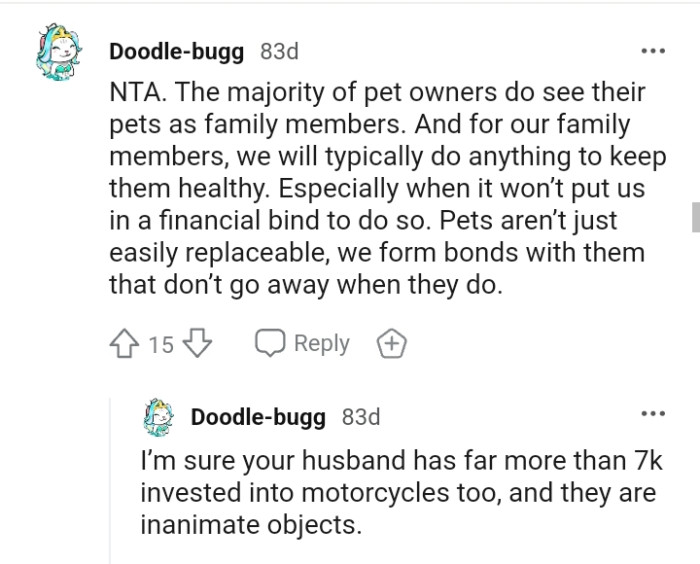
You are a good cat mom
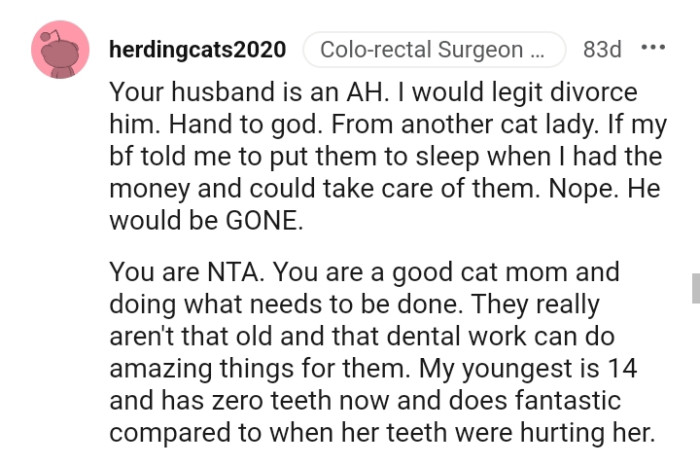
Experts in animal welfare suggest that open dialogues about pet care, including financial aspects, can foster mutual understanding and respect between partners. Implementing a shared decision-making framework might help couples navigate these difficult conversations. This framework involves discussing values, financial limitations, and prioritizing the pet's quality of life while respecting each other's viewpoints.
Engaging in joint discussions about pet health can also help both parties feel more involved and less conflicted, paving the way for more cohesive decision-making that honors both emotional attachment and practical considerations.
This Redditor had a similar story to share
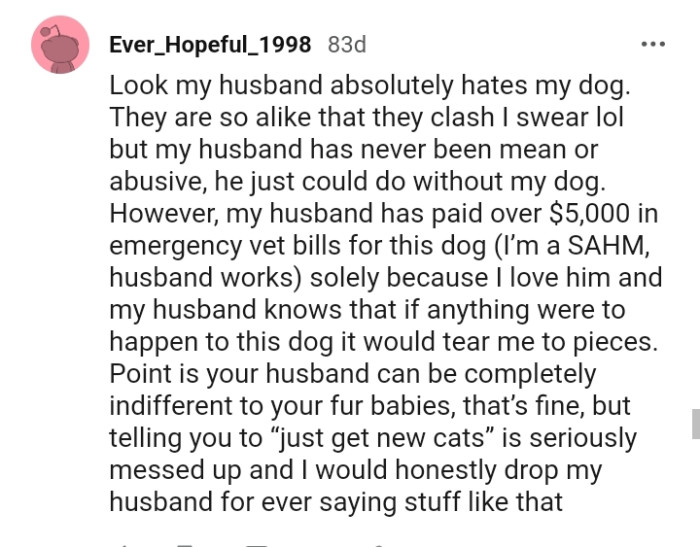
Your husband doesn't understand that pets are family

Living with someone who's not a cat person
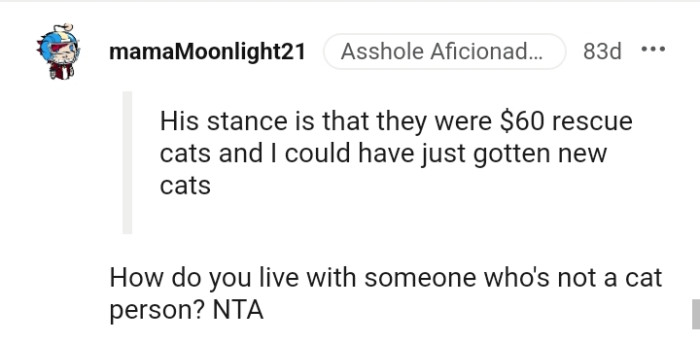
Coping with Conflict in Relationships
Disagreements over pet care can serve as a microcosm of larger relational dynamics. Relationship experts emphasize that how couples handle conflict can significantly impact their emotional health and relationship satisfaction. Research has shown that constructive conflict resolution strategies, such as active listening and empathy, enable partners to navigate disagreements more effectively.
By focusing on collaborative problem-solving rather than confrontational approaches, couples can reach agreements that honor both perspectives. This skill is crucial, particularly when emotions run high over issues like pet health, where personal attachments and values are deeply intertwined.
You never know what might happen

The jury is still out on the OP's husband

Your cats and your expense

It's worth noting that societal expectations can play a role in how individuals perceive their responsibilities toward pets. Cultural narratives often shape perceptions about the 'right' way to care for animals, which can lead to feelings of inadequacy if one’s practices diverge from these norms. A cultural psychologist indicates that understanding these societal frameworks can help individuals critically assess their caregiving choices without undue pressure.
Acknowledging the influence of culture on pet care decisions can promote more individualized decision-making that aligns with one's resources and values, rather than succumbing to external pressures.
The majority of cats quickly recover after having a tooth extracted. Your cat will probably be able to go home the same day as the procedure.
Your cat's general health, how their pain is managed after the extraction, and how they respond to anesthesia will all impact how well they recover. Share this post with your pet-loving family and friends.
Psychological Analysis
This situation highlights the profound emotional bonds many people form with their pets, often viewing them as family members. The woman's decision to spend $7,000 on her cats' dental care likely stems from a deep sense of responsibility and love, which can trigger feelings of guilt when financial constraints or differing opinions arise, especially from a partner who doesn't share the same connection. This dynamic can lead to significant cognitive dissonance, where she may feel torn between her commitment to her pets and the financial realities presented by her husband’s perspective.
Analysis generated by AI
In conclusion, navigating the complexities of pet care and interpersonal relationships requires a nuanced understanding of emotional bonds, societal expectations, and individual values. Research consistently shows that open communication and mutual respect are crucial in managing conflicts arising from differing beliefs about pet health.
By fostering a collaborative approach and practicing empathy, couples can not only improve their decision-making regarding pets but also strengthen their overall relationship dynamics. Ultimately, understanding and addressing the psychological aspects of pet ownership can lead to healthier, more fulfilling caregiving experiences.



